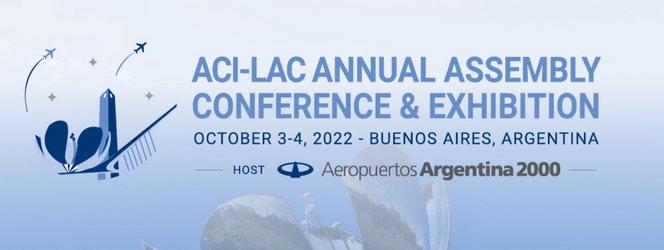Source: ACI-LAC
- The Assembly and Conference of Airports Council International Latin America and the Caribbean 2022 | ACI-LAC Annual Assembly Conference & Exhibition 2022 ended this Tuesday (4) with discussions on the role of tourism in the recovery of the airline industry in the region; the power of social networks to boost travel; technological solutions to improve the passenger experience, innovations to increase accessibility at airports, the future of aeronautical work, among other topics.
The Assembly and Conference of Airports Council International Latin America and the Caribbean 2022 | ACI-LAC Annual Assembly Conference & Exhibition 2022 ended this Tuesday (4) with discussions on the role of tourism in the recovery of the airline industry in the region; the power of social networks to boost travel; technological solutions to improve the passenger experience, innovations to increase accessibility at airports, the future of aeronautical work, among other topics.
In the panel “The recovery of the air sector in Latin America and the Caribbean”, participants addressed the challenges related to the improvement of airport infrastructures, the increase in oil prices, the value of airline tickets, however, they cited the strength of tourism and the need to invest in sustainable fuels (SAF) as factors that can boost the development of the sector in the coming years.
“Brazil has infinite sources for the production of SAF and we are working to make it a reality. We have technology for that as well, but currently there is still no way to have SAF at commercial prices,” acknowledged Ronei Glanzmann, Brazil’s National Secretary of Civil Aviation.
“As an industry, we need to act together to be more competitive. In Europe, people make 4 to 5 trips, on average, per year. In Latin America and the Caribbean, this rate is 0.62 per person. The message from governments is that recovery here comes from tourism, but taxes need to be reviewed. When we negotiate together as an industry with the government, we can help increase tourism,” said Peter Cerda, IATA regional vice president for the Americas.
Andrew O’Brian, president and CEO of Centerline Airport Partners and former president of ACI-LAC, highlighted the role of the Airports Council International for Latin America and the Caribbean with its various programs that support airports in the region, especially the smaller ones with fewer resources, with information, consulting, and establishing bridges between airports and other companies in the sector.
“In the case of eVTOLs, there are currently many investments in this segment and regulators are starting to certify them. That is the future. You have to know how to prepare the infrastructure and ACI-LAC is doing an excellent job under the leadership of Rafael Echevarne,” O’Brian quoted the ACI-LAC CEO as saying.
Influencers
The panel “The Impact of Social Media on the Travel and Tourism Market” discussed how content producers and travel agencies, airlines and airports have been working together.
Jorge Rosales of Aeroportos Argentina 2000 noted that influencers are now strategic allies of the industry. “During the pandemic, influencers were instrumental in providing information to the public about vaccinations, health restrictions, and entry into countries. In addition, their job is to understand what people are looking for. They are the ones who capture the sentiment about dining, tours, accommodations, which is critical to the travel and tourism sector.”
Accessibility
How can the airport community be trained to recognize the different demands of passengers with special needs, attend to them and establish a closer relationship with them? This was one of the points discussed during the panel “Innovative solutions to facilitate accessibility”.
Alejandro Restrepo, from IATA, highlighted the need to eliminate barriers that prevent people from accessing the travel system. “The commitment is to materialize this idea into concrete actions and for that we work with ICAO so that there are policies and they are followed by regulators, airlines and airports.”
According to Raul Revuelta, CEO of Grupo Aeroportuario del Pacifico (GAP), accessibility at airports should work like all other aspects of the passenger experience program and what should be sought is equal treatment for all. “It is important to work with NGOs and foundations that share with us concrete information of the reality so we can build inclusion programs at airports, that is, how to prepare materials, how to communicate, how to involve the airport community.”
Airport Workforce
The labor universe was also discussed in the panel “The Future of Airport Labor,” which highlighted, among other points, efforts to maintain the aviation workforce during the Covid-19 pandemic.
“We worked with the unions to maintain commitments to protect jobs. The new situations made us experiment with other ways of working and we designed a new organizational model that remained in place for deliveries after the pandemic,” said Verônica Bargiela, HR director of Aeroportos Argentina 2000.
Another point discussed was how to overcome the challenge of attracting new professionals to a market that has undergone sudden and profound changes in the last 3 years.
“How to keep the interest of the young people of generation Y and Z, who will be the workforce in the coming years? It’s a question we ask ourselves every day. People want to work in companies where they feel good, respected and challenged. We need to rethink how we can generate work contexts so that people can enjoy work,” said Isabela Dantas, human resources director at Vinci Airports Brazil.
Hosted by ACI-LAC, the Annual Assembly and Conference of Airports Council International Latin America and the Caribbean, the main event of the airport market in the region, brought together authorities and more than 300 executives and experts from the aviation industry in Latin America on October 3 and 4 to discuss solutions to the main environmental, social and governance challenges facing the sector.
We thank the sponsors of this event: Exolum, Mera Corporation, Terpel, Arconas, IT Aérea, AvPorts, SITA, World Fuel Services, Collins Aerospace, NACO, InterVISTAS, Dufry, Smiths Detection, SSP America, TAV Technologies and Amadeus and EC Solutions.


